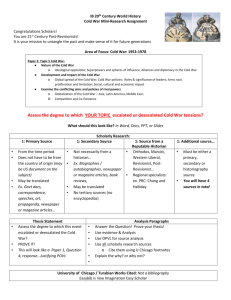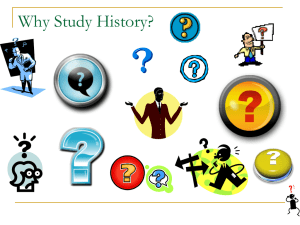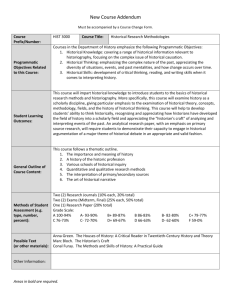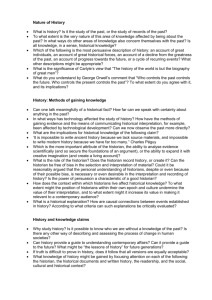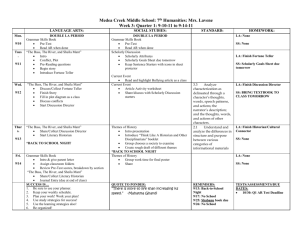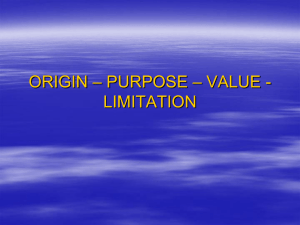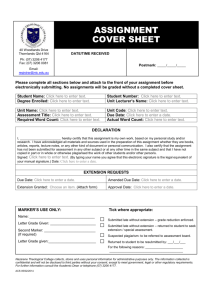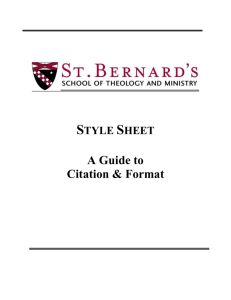IB-MIni-research-coldwar
advertisement
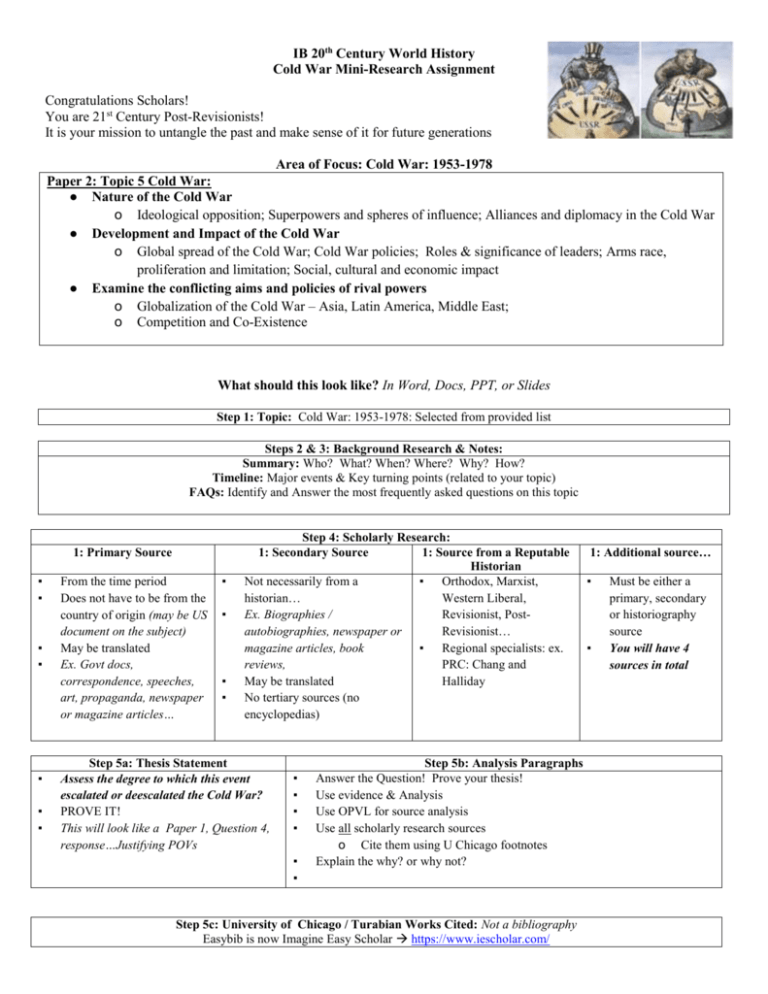
IB 20th Century World History Cold War Mini-Research Assignment Congratulations Scholars! You are 21st Century Post-Revisionists! It is your mission to untangle the past and make sense of it for future generations Area of Focus: Cold War: 1953-1978 Paper 2: Topic 5 Cold War: ● Nature of the Cold War o Ideological opposition; Superpowers and spheres of influence; Alliances and diplomacy in the Cold War ● Development and Impact of the Cold War o Global spread of the Cold War; Cold War policies; Roles & significance of leaders; Arms race, proliferation and limitation; Social, cultural and economic impact ● Examine the conflicting aims and policies of rival powers o Globalization of the Cold War – Asia, Latin America, Middle East; o Competition and Co-Existence What should this look like? In Word, Docs, PPT, or Slides Step 1: Topic: Cold War: 1953-1978: Selected from provided list Steps 2 & 3: Background Research & Notes: Summary: Who? What? When? Where? Why? How? Timeline: Major events & Key turning points (related to your topic) FAQs: Identify and Answer the most frequently asked questions on this topic 1: Primary Source ▪ ▪ ▪ ▪ ▪ ▪ ▪ From the time period Does not have to be from the country of origin (may be US document on the subject) May be translated Ex. Govt docs, correspondence, speeches, art, propaganda, newspaper or magazine articles… ▪ ▪ ▪ ▪ Step 4: Scholarly Research: 1: Secondary Source 1: Source from a Reputable Historian Not necessarily from a ▪ Orthodox, Marxist, historian… Western Liberal, Ex. Biographies / Revisionist, PostRevisionist… autobiographies, newspaper or magazine articles, book ▪ Regional specialists: ex. reviews, PRC: Chang and May be translated Halliday No tertiary sources (no encyclopedias) Step 5a: Thesis Statement Assess the degree to which this event escalated or deescalated the Cold War? PROVE IT! This will look like a Paper 1, Question 4, response…Justifying POVs ▪ ▪ ▪ ▪ ▪ ▪ Step 5b: Analysis Paragraphs Answer the Question! Prove your thesis! Use evidence & Analysis Use OPVL for source analysis Use all scholarly research sources o Cite them using U Chicago footnotes Explain the why? or why not? Step 5c: University of Chicago / Turabian Works Cited: Not a bibliography Easybib is now Imagine Easy Scholar https://www.iescholar.com/ 1: Additional source… ▪ ▪ Must be either a primary, secondary or historiography source You will have 4 sources in total Mini-research assignment components: Step 1: Select a Topic for Investigation: ● Cold War events and individuals are restricted to: 1953-1978 ● Ultimately, you must assess how this event escalated or deescalated Cold War tensions Step 2: Research! LEGITIMATE / VALID source materials Library Databases should be a starting point No Encyclopedias! Be careful with GALE & ProQuest articles… Research like a professional (aka No random Googling) Jstor, Google Scholar, Presidential Archives, National Archives, US Office of the Historian, Museums & Historical Organizations, Scholarly Societies, Think Tanks Step 3: Note Sheets on Background Information: o Summary: Who? What? When? Where? Why? How? o Timeline: Major events & Key turning points (related to your topic) o FAQs: Identify and Answer the most frequently asked questions on this topic ** Keep track of source citation materials for works cited (U Chicago / Turabian style)** Step 4: Scholarly Research Sources: Sources: 4 in total o Primary: From the time period, does not have to be from the country of origin o Secondary: Not necessarily from a historian, Ex. Biographies / autobiographies, newspaper or magazine articles, book reviews, May be translated, No tertiary sources (no encyclopedias) o Reputable Historian: Orthodox, Marxist, Western Liberal, Revisionist, PostRevisionist…Regional specialists: ex. PRC: Chang and Halliday o Additional Source: Must be either a primary, secondary or historiography source ▪ You will have 4 sources in total Step 5: Written Analysis: Assess how ______escalated or deescalated Cold War tensions Analysis – using all sources o Escalation or De-escalation? o Answer the Question! Prove your thesis! o Use evidence & analysis o Must consider and use OPVL for source analysis o Use all scholarly research sources ▪ Cite them using U Chicago / Turabian footnotes ▪ Explain the why? or why not? Works cited – U Chicago / Turabian style citations (https://www.iescholar.com/) Cold War: 1953-1978: Research Topics Pick ONE to investigate ● Asia: o o o o o o o o 1953: UN division of Korea at 38th parallel (Korean War: 1951-1953) 1954: Fall of Dien Bien Phu, end of first Indo-China war 1956: Mao’s Hundred Flowers Campaign 1958-1961: Mao’s PRC: Great Leap Forward & Five Year Plans 1964-1973: Role of JFK in Vietnam War 1966-1976: Cultural Revolution, Red Guard 1967: Formation of ASEAN 1971-2: PRC admittance to the UN & UNSC, Nixon in China ● Egypt & Middle East: o 1956-1970: Rise of Gamel Abdel Nasser o 1956: Egypt & Aswan Dam o 1958-1961: United Arab Republic (UAR) = Syria & Egypt o 1961: Non-Aligned Movement (1955: Bandung Conference) o 1966-2000: Rise of Hafez al-Assad regime in Syria o 1967: Six Day War o 1973: Yom Kippur War ● Latin America: o 1946-1955 or 1973-1976: Ideology of Peronism (Third Position, Third Way) ▪ 1946-1952: Role of Evita o 1959-1960: Cuban Revolution o 1959-Present: Ideology of Fidelismo o 1961: Bay of Pigs Invasion o 1962: Cuban Missile Crisis o 1972: Cuba = full member of COMECON o 1976-81: Cuban troops sent to support Angola’s left-wing MPLA ● USSR & Eastern Bloc Countries: o 1955: Warsaw Pact o 1956: Hungarian Revolution o 1956: De-Stalinization under Nikita Khrushchev o 1958-61: 2nd Berlin Crisis / Construction of the Berlin Wall o 1968: Prague Spring o 1968: Brezhnev Doctrine o 1973: Geneva Conference o 1975: Helsinki Accords o 1977: Charter ‘77
